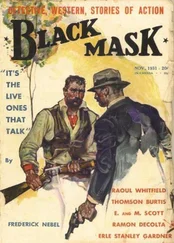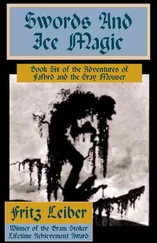After a while, Bretilf stirred. “Do we go in? Or retreat?”
“All’s lost, it seems, whatever we do.” They dismounted, tethered the horses among the roses, and walked straight in at the soft-lighted door.
They were at once in a charmingly informal hall, lit by depending lamps of fretted bronze and lavender glass. Luxurious rugs clothed a floor of delicate rainbow tiling.
A long table had been loaded with tall gilded flagons individually filled with black ale, red wine, blue spirit, or honeyed beer. A selection of pies, smoking roasts, cheeses, dewy salads, fruits, and sweets of many kinds waited on plates of gold or in dishes of silver decorated with pearls and zircons.
“Do you trust this feast?” asked Zire.
“Less than I’d trust a starving thief who jumped in the window.”
“My own thought. Shall we dine?”
“Let’s do so.”
But even as they pulled out the gilded chairs to sit, a curtain across the length of the room blew back, and out stepped a vision that stopped them, once more, in their tracks.
A young woman, again, but this time of surpassing attractions. The undeniable beauty of her face was made yet more marvelous by two large eyes of velvet darkness. From her lovely head cascaded darkly shining hair in loose curls, that each took a chestnut highlight from the lamps. Her slim but voluptuous figure had been clad in a filmy gown of amethyst silk, caught at the waist by serpentine twists of white gold.
“How rewarding that you should call on me,” said this apparition, in a musical voice that suggested the color of smoky peach mixed with platinum. “Pray sit.”
Bretilf the Artisan and Zire the Scholar—sat.
Instantly, some bowls of scented water were brought to them, by a pair of white rabbits. Without comment, each man rinsed his hands, at which two black rabbits appeared to offer linen towels. All four rabbits had come from under the table draperies, to which area they next withdrew. But, unceremoniously yanking up the drapery, Zire and Bretilf peered beneath—to find no sign of rabbits, bowls, towels, nor any hatch that might afford entry and exit.
Reemerging from under the cloth, the two found instead their beautiful hostess had herself sat down at the table’s central position. Her serenity was exquisite.
“Brave sirs, do choose whatever you wish to eat. Munch and Janthon there will serve you.”
Anticipating further rabbits, Bretilf and Zire were startled when a handsome, long-haired white cat appeared, walking upright out of a bouquet of pale flowers at the table’s southern end. In another breath, a larger, but also handsome, short-haired black dog manifested at the table’s northern end. This being stood on the floor by Zire’s chair. The dog, too, walked upright, which meant its head was level with Zire’s own—it was a large canine indeed.
Zire pulled himself around with a little effort. “Good evening, Janthon,” said Zire. “If you’ll be so kind, I will have—”
“No trouble, sir,” replied the dog with faultless articulation. “Your mind is read.” And, taking the proper implements from the board, dexterously began to slice for Zire the very cooked fowl he had been intent on. That done, Janthon stalked to Bretilf’s place and, unasked, extended agile front paws and carved up for him a paté and a pie. Munch the cat meanwhile filled Bretilf’s crystal glass of spirit, and now came to Zire to pour his silver tankard of beer.
Unnoted during these operations, three white owls had entered through a high window. Perching upon golden stands, they now began to sing a quiet but melodious trio, to the accompaniment of three black, crow-like birds, which seemed to have arrived via the mansion’s open door. One beat a drum with its claws, another performed on a small harp, which it struck tunefully with one wing. The third whistled through its beak.
Zire and Bretilf ate and drank some while without a word exchanged.
At last, Bretilf spoke levelly to Zire. “Have we gone mad?”
“I think so,” answered Zire in an offhand way. “Probably some effect of the geas, or else too strong a drug used to subdue us in the city.”
“Or, alternatively, perhaps it’s a dream.” Bretilf turned to their delicious female companion, who sat quietly sipping a goblet of sherbet laced with wine. “Would you say so, madam?”
“All life is a dream,” she replied, smiling. “Or so it is said.”
“You are then a philosopher, lady,” said Zire.
“No. I am a witch. Whose name is Ysmarel Star.”
Zire and Bretilf put down their silver knives and drinking vessels. Each man rose.
“A witch. What else? I fear,” said Zire, “we must be on our way.”
“Urgent business at a castle,” elaborated Bretilf, “involving doom and horrible death.”
Ysmarel Star nodded. “So many have passed by, en route to such a fate. Few ever listened to my messenger, Loë.”
“Perhaps, unlike ourselves, they knew your true vocation—witchcraft—and were too…respectful to call. There is sorcery enough in the city and the forest, surely. It tends to make even desperate men—among whom we must be counted—reluctant.” This, from Zire.
“We trust not to offend by such frankness,” finished Bretilf.
But Ysmarel paid no attention. She went on as if neither of her guests had spoken a word.
“Of the few who did heed Loë, none before, suspecting a trap, dared enter my house. There were others who, having seen Loë, failed to see my gate, or anything else. It takes, gentlemen, a particular type of acuteness and sparkle, to note such things. Even that a rabbit, cat, or dog waits on them at table. That owls make music. Let alone the presence of my humble self.”
“Any man who missed seeing you, fair lady,” said Zire, “would need to be blind, and other things besides, perhaps more personally unhappy in his lower regions.”
Bretilf said, “Any man who failed at seeing you, Ysmarel, would need to be dead .”
“However,” continued Zire, “we must get on.”
“To be late for a doom is the worst bad manners,” augmented Bretilf.
Ysmarel still gave no heed.
“I have known for long months the imposed task which the False Prince of Cashloria sets any transgressor: to steal back the Robe of War-Winning. It is a hopeless venture. Men of great courage and genius have gone to the doom you refer to. Even thirteen women of unusual battle-skills and wisdom. But all perished, male and female alike. And each, it’s true, ended horribly.
“For example,” continued Ysmarel Star, modifying her stance rather in the manner of certain feminine storytellers, “the glamorous and gifted sword-mistress, Shaiy of the Red Desert, having killed two guards who attempted unwanted affection, was sentenced to seek the Robe.
“Shaiy was well known for her varied warrior talents, not to mention her learning and quick wit. It’s said she could compose an ode worthy of the greatest poets in twice ten minutes. Or a bawdy song inside three slow heartbeats. Riddles she could answer while asleep. She was a notoriously sage robber, said to have stolen the Great Emerald of Gullo. Though she then kindly gave it away to a destitute lover. But even Shaiy only returned from the evil castle dead, and minced small, everything of her in a tiny box, all but her dainty white ears—which were pinned on the lid in the exact form of a butterfly.”
Zire studied his boots; Bretilf cleared his throat.
Ysmarel simply clapped her slender hands. At the signal, every light in the mansion died, every waft of perfume, tasty dinner, or music—fled. A dog barked once, a rabbit squeaked, and a cat spat. A rattle of wings and clatter of discarded perches and instruments revealed where crows and owls beat it at top speed through a window and a door. The room had become black as tar. Only the star gleamed on the garden outside.
Читать дальше











